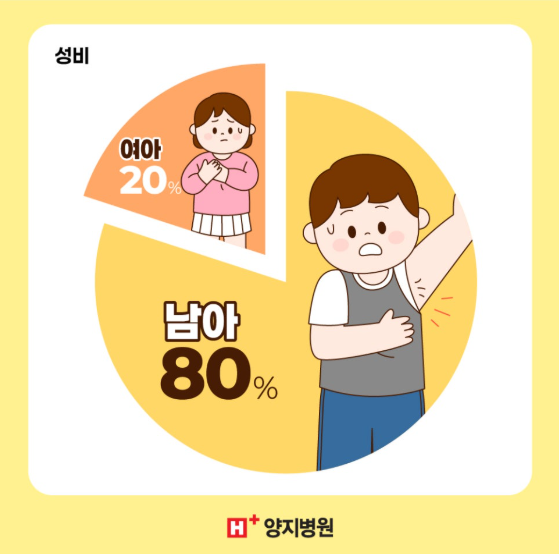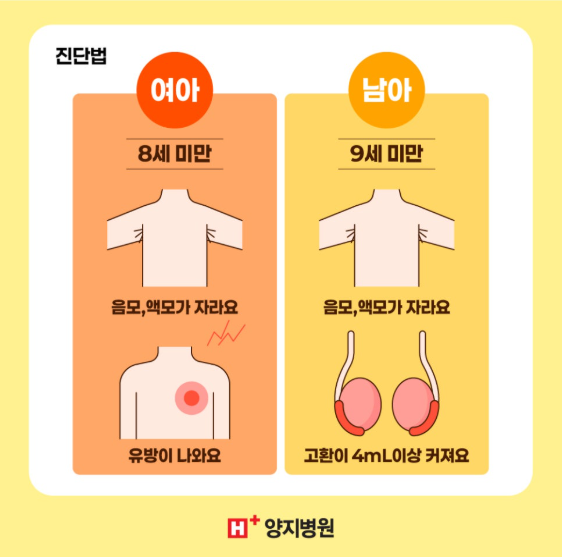As a parent, it’s natural to have concerns about your child’s growth and development. Some children seem to grow faster or slower than their peers, while others may experience early signs of puberty that might feel alarming. One condition that has been increasingly diagnosed in recent years is precocious puberty. Understanding the causes, symptoms, and treatments can help you manage the situation and ensure your child’s well-being.

1. Understanding Precocious Puberty: Gender and Statistics
Precocious puberty refers to the early onset of physical changes associated with puberty, such as the development of breasts in girls or an increase in testicle size in boys. Typically, puberty begins for girls before age 8 and for boys before age 9.
According to research, precocious puberty is about 10 times more common in girls than in boys.
- Diagnosing Precocious Puberty: Signs to Watch For
Precocious puberty is marked by the early onset of puberty. Signs in girls include the development of breasts or the appearance of pubic hair before age 8. For boys, it may involve the appearance of pubic hair or the enlargement of testicles beyond 4mL before age 9.
Diagnosis is confirmed through medical tests such as hormone level checks, ultrasounds, and MRI scans to rule out other conditions.
3. Causes of Precocious Puberty
Several factors can contribute to the onset of precocious puberty, ranging from lifestyle choices to underlying medical conditions.
- Obesity: One of the most common contributors to precocious puberty is obesity. Overeating high-calorie foods, including fast food and sugary snacks, has led to an increase in childhood obesity. This excess fat leads to higher levels of leptin, a hormone that triggers the production of sex hormones, ultimately bringing on early puberty.
- Environmental Hormones: Chemicals found in plastics, pesticides, and certain food packaging materials can disrupt the body’s natural hormone production. These endocrine-disrupting chemicals (EDCs) mimic or block the body’s sex hormones, contributing to hormonal imbalances and the early development of puberty.
- Central Nervous System Issues: Precocious puberty can sometimes result from tumors or trauma affecting the brain, pituitary gland, or adrenal glands. These issues can interfere with the hormonal signals that control puberty. Rare genetic conditions like McCune-Albright syndrome can also cause early puberty by affecting bone growth and hormone production.
Lifestyle Factors: Insufficient sleep and excessive screen time can interfere with melatonin production, a hormone that regulates sleep and puberty. Poor sleep habits can disrupt hormonal balance and contribute to the early onset of puberty.
4. Types of Precocious Puberty
- Central Precocious Puberty: This is the most common type, where puberty begins too early without any underlying health problems. In some cases, central nervous system issues, such as brain tumors or injury, can trigger early puberty. Genetic conditions like McCune-Albright syndrome may also be involved.
- Peripheral Precocious Puberty: This type is less common and occurs when an issue outside the brain, such as an ovarian or adrenal tumor, causes the body to release sex hormones prematurely. It is more often related to tumors in the adrenal glands or ovaries, or genetic disorders affecting hormone regulation.
5. Symptoms of Precocious Puberty
Common symptoms include:
- Girls: Breast development, the appearance of pubic or underarm hair, and the onset of menstruation.
- Boys: Enlargement of the testicles and penis, deepening of the voice, and facial hair growth.
- Both Genders: Rapid growth in height, acne, and the development of body odor.
These physical changes can lead to emotional distress as children may feel out of place or embarrassed compared to their peers.
6. Treatment for Precocious Puberty
Treatment aims to slow down the progression of puberty to prevent early closure of growth plates and the resulting stunted adult height. Treatment also helps manage the emotional and physical consequences of early puberty.
- Hormone Therapy: Children diagnosed with precocious puberty are often prescribed hormone-blocking injections every 4 to 12 weeks. These injections prevent the production of sex hormones, allowing the child to grow at a normal pace and avoid early physical maturation.
- Lifestyle Modifications: In addition to medical treatment, healthy lifestyle changes can help prevent further complications:
- Balanced Diet: Encourage a diet rich in fruits, vegetables, lean proteins, and whole grains. Avoid excessive consumption of high-calorie, fatty foods that can contribute to obesity.
- Regular Exercise: Regular physical activity is essential for managing weight and promoting healthy growth.
- Proper Sleep: Reducing screen time before bed and ensuring your child gets enough sleep can help regulate hormones and prevent premature puberty.
7. Impact of Precocious Puberty on Growth and Development
While children with precocious puberty may appear to grow quickly and taller than their peers, this rapid growth is often followed by an early cessation of height growth. The early onset of puberty can lead to the premature closure of the growth plates, resulting in a shorter adult height compared to children who undergo puberty at the typical age.
Additionally, the emotional toll on children undergoing early puberty can be significant. Children may feel awkward, embarrassed, or self-conscious as they experience changes that make them feel out of sync with their peers. This can lead to psychological stress, anxiety, and even behavioral changes, such as aggression or withdrawal.
8. Addressing Emotional and Psychological Impacts
Precocious puberty can lead to emotional challenges, especially when children are not prepared for the changes happening in their bodies. To support children through this period, it’s essential for parents to:
- Talk openly with your child: Help them understand that early puberty is a natural biological process, even if it feels awkward. Providing reassurance and answering their questions can reduce anxiety.
- Provide psychological support: Encourage your child to express their feelings and provide emotional support to help them cope with any stress or discomfort caused by early puberty.
9. Preventing Precocious Puberty: Practical Steps for Parents
While it’s not always possible to prevent precocious puberty, there are steps you can take to reduce the risk:
- Maintain a balanced diet to prevent childhood obesity, which is a major contributing factor.
- Encourage physical activity to promote healthy growth and prevent excessive weight gain.
- Limit exposure to environmental hormones by choosing products that are free from endocrine-disrupting chemicals.
- Ensure regular health check-ups: Follow the recommended schedule of routine medical exams to monitor growth and development.
Conclusion: Timely Diagnosis and Treatment Are Key
If you suspect your child is undergoing precocious puberty, early intervention is crucial. By seeking medical advice, you can ensure that any underlying issues are addressed, and that appropriate treatment is started. With the right care and support, children with precocious puberty can lead healthy, balanced lives and reach their full growth potential.
Understanding the condition, managing it with proper medical and lifestyle interventions, and providing emotional support for your child can make all the difference in helping them navigate this challenging phase of development.
 +84 24-7306-9889
+84 24-7306-9889  Booking
Booking 






